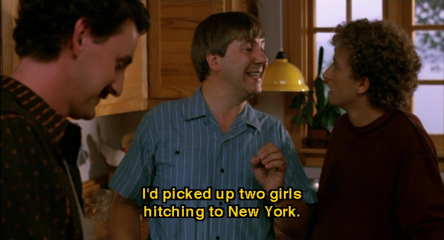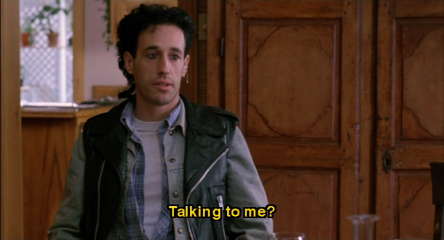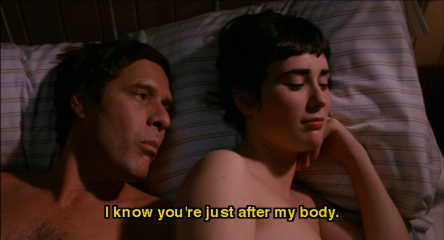Film Review: The Decline of the American Empire (2003)
Le Déclin de l'Empire Américain
(The Decline of the American Empire) (1986)
directed by Denys Arcand
Frames in this review are taken from the Koch Lorber DVD, released in
2004.
The Decline of the American Empire is a satirical title, because the film is actually about sex. Look at the movie poster: three people holding up placards with the letters “S E X!” marked in pink. Except that the characters in Decline are academics at a Canadian university, so what they actually do is sit around and talk about their sexual escapades. Indeed, this is a very stagy film, one that has barely been opened up for film with only moderate use of location and camera moves. And these are more eye candy than a visual language -- as when the camera focus-pulls back and forth as a character exercises on a weight machine. A stage version could make do with only three sets: a kitchen, a gym, and a living room.

The film recounts one day among a group of academics in Québec. Rémy (Rémy Girard) is hosting a dinner party for his friends, and is spending the afternoon cooking with the help of three male buddies. His wife is off at the college gym, working out and swapping girl talk with the three other female invitees. As the dinner takes shape, both the men and the women talk frankly about sex — about lovers, partner-swapping, dangerous hitch-ups, drug-enhanced orgasms, and more.
The ensemble characters are defined principally in terms of their sexual relationships. Diane (Louise Portal) reveals red whip marks on her back in the locker room, and explains that she's been pursuing a masochistic relationship with a guy she met at a bar, the rough biker type Mario (Gabriel Arcand). Diane previously could never stand to be dominated by a man, but now she loves getting her hair pulled "like a horse's mane" while crouching doggy-style. This revelation does not remotely faze History Department Chair Dominique (Dominique Michel), who herself has had a threesome with two buff Martiniquers on vacation. The most conservative of the women is Rémy's wife Louise (Dorothée Berryman), who feels naughty for having merely flirted with her tennis instructor. She is under no illusions that her husband has been 100% faithful, but feels that a couple of quickie affairs at conferences are not so bad, considering that her relationship closer to home has been quite stable.
Rémy is an irrepressible know it all, animatedly lecturing his class about the importance of numbers in history (the South African blacks can't possibly lose, but the North American blacks don't stand a chance). But his marriage doesn't hold him back from acting like a swinging bachelor, whether meeting UCLA grad students or picking up a couple of teenage girls hitchhiking to New York. To help him with the cooking, Rémy has invited his gay friend Claude (Yves Jacques), who is troubled by painful and bloody urination, evidently a souvenir from one of his one-night stands. Pierre (Pierre Curzi) is living with a young girlfriend whom he met at a massage parlor. He’s at first taken aback to hear that she is a history student at the very same university. But Danielle (Geneviève Rioux) is the type of girl who happily discourses on millennialism while performing "the special" service for $25. How can you resist a girl who talks shop with you in bed? Pierre can’t. The final member of the group is curly-haired student Alain (Daniel Brière), who says that he "is not like you guys; I don't want to fuck a new girl every night."

The men and women are much less frank when they finally meet up for dinner. But this façade doesn’t quite work, for Mario crashes the party in his jeans and his Jeep. He quickly gets bored with the conversation, and demands that they dispense with the talking and proceed to the orgy. Seeing no takers, he drags Diane off for some more BDSM play. Meanwhile, Dominique reveals that she'd slept with Rémy. This shatters Louise, who realizes that her husband has not been faithful close to home either. As Rémy desperately tries to pick up the pieces of his marriage, the others bask in the radiance of the morning after.
One-liners
The film is all about witty repartee, and there are a number of clever one-liners. Many of the multi-line exchanges are also essentially set pieces. Except for their common sexual theme and the way they fit into the plot (which is much-interrupted for flashbacks), the characters’ stories of their sexual escapades might as well be a series of short one-scene plays strung together for maximum titillation. As might be expected for such a dialog-heavy film, some of the wordplay gets lots in the English translation, as happened to the pun cheveux/chevaux (“horse’s mane”). However, the translators have generally done a good job of translating thematically rather than literally.

Rémy's memories of his sexual conquests are much fonder than the fiasco-filled episodes shown in the flashbacks. The first time he sleeps with Diane, she calls up her husband afterwards and calmly gives him the motel address. Later, her young daughter comes in and demands that he get out. And while he’s scrambling around to get dressed after all these episodes, he’s constantly forgetting his ring. Dominique likewise remembers some awkward moments while spouse-swapping at a swingers’ party. The verbal sparring around sex appears to extends to the sex act itself — it's a contact sport that leaves bruises.
The philosophy tucked in amongst the sex talk is similarly filled with one-liners. There was that discussion of the fate of blacks in South Africa and America, for example. There’s also a rather nice moment when the group stands outside under the stars, wondering if they'd be able to see the Soviet missile falling on Plattsburg. (No, one of them points out, "the missiles don't fall, only the warheads.") The actors have fine comedic timing. Rémy's pronouncements are always delivered in an irrepressibly certain tone, and Diane's openers about her sexual experiences are always deliberately boastful.

There are some hints of deeper issues that poke through the verbal badinage. Diane ruefully discusses the infamous baby gap, in which her taking time off to raise children has left her a decade behind her peers on the career ladder, without tenure and earning a tiny stipend as a TA. When Dominique suggests that Pierre write a paper about a topic discussed during dinner, he refuses and points out that 17000 academic papers are written every day. Why bother when nobody will read what you’ve written? There is just the barest glimmer that touches on the decline in the film’s title: shorter workweeks, refusal of military service, and skyrocketing national debt. But the discussion never gets past the depth of witty dinner-party remarks.
Obviously, the film is intended as a rather wittily naughty display of conversational acuity. So why am I noticing the philosophy buried amidst the banter? Because, oddly enough, this sets up the sequel of the film, a much-acclaimed drama that won an Academy Award. for Best Foreign Language Film.

Decline vs. Invasions
The title of the sequel, The Barbarian Invasions (2003), plays on The Decline of the American Empire. But this is not satirical; it is all in earnest. Indeed, it is rather an inspired move on the part of director Denys Arcand to place these comic characters into a totally different, rather bittersweet environment two decades later. From carefree sex at a time of Western dominance to worrying about (Canadian) Medicare in the post-9/11 economic recession, these characters trace out the same arc as does the society in which they live. Where once all they had to talk about were suburban boredom, BDSM, and casual flings, now they have to wrap their heads around globalization, the healthcare crisis, terrorism, religion, and the decline of the welfare state.
Those heady topics are tackled in Invasions with great depth, subtlety, and intelligence. The academic ribaldry of Decline is acknowledged through the occasional joke about Raymond Poincaré's mistress. But Invasions finally reveals to us the non-sexual elements of these characters’ lives. With a backstory already in place for its ensemble of characters, changes in fortune and circumstance become significant. Claude, for instance, is now happily settled in with a domestic partner. In Decline, he was put in merely to add homosexuality to BDSM and partner-swapping as unconventional sexual practices to titillate the audience. But in Invasions, he now represents the settling down of homosexuality into a comfortable role in society – from the easy hookups and AIDS scare of the 1980s to upstanding citizens in stable relationships. (If Arcand had waited until the 20th anniversary, his character could’ve taken advantage of same-sex marriage in Canada.)
To be fair, Invasions has home-court advantage when it comes to stirring the audience's hearts: Rémy is dying. Actors live for death scenes, but this one is actually not so important as the wrapping up of loose ends that comes before. The screenplay deftly ties together the personal drama with topics of great social significance. Rémy declares that he voted for Medicare (Canadian universal health care) and will die by it. Indeed, the Canadian welfare state is crumbling, as the overcrowded and dimly-lit corridors of the Québec hospital contrast with the sparkling-clean New York hospital to which Rémy is driven for radiation treatment. In Invasions, then, locations are actually used to explore important themes rather than serving merely as pretty backdrops.
But if Rémy wants to unswervingly uphold his commitment to universal health care, his son Sébastien would rather he live his remaining days in comfort. Sébastien has returned to Canada from across the Atlantic, where he swims easily in the global economy as a financial trader. Accustomed to getting things done in foreign bureaucracies, he arranges to renovate part of an unused wing of the hospital, for his father to enjoy the bright cheery comfort that private money can buy. Sébastien knows how to persuade Canadian hospital administrators who at first refuse to treat his father differently from any other patient. He knows how to deal with . He can deal with the union, which insists on a closed shop and restrictive work rules for his father’s single wing of the hospital. And he also knows how to work with drug dealers, for his father’s morphine become ineffective for easing his pain, and a nurse suggests acquiring some heroin.
Sébastien's French girlfriend Gaêlle is a sleek and stylish art trader working for an auction house. Her English boss asks her to combine work with family emergency, dispatching her to search for art treasures held by the Catholic Church. But there are no treasures, and she finds herself walking amidst vaults filled with worthless crosses and madonnas, as the priest forlornly tells her of the day people stopped coming to mass. This is an eloquent exposition of the impact of the Quiet Revolution, as well as a pointed jab at the Americans, who've already been through the vault and bought everything of value.
Sébastien did not even make an appearance in Decline, but the contrast with his hedonistic father could not be more stark. Paralleling Rémy's son Sébastien is Diane's heroin-addict daughter Nathalie. Last seen in Decline as a twelve-year old screaming at Rémy to leave her mother's bed, she ended up somewhat messed up from the occasional parental cuddling and smooching. (As Louise asks Diane in the gym in Decline, "You're not worried? Psychologically?")
The neat thing about Invasions it that it takes throwaway lines from its lighthearted predecessor and expands them into their logical consequences. While the Empire was declining and the senators were having their orgies, there were real consequences on the next generation. Some of the children were damaged, and others opted out of their parents’ foibles and made their success in a different way. It is a tribute to Arcand's screenwriting abilities that two dissimilar films could be connected in such a close-knit fashion, and rather inspired to illustrate the concerns of an unsettled world using characters who previously were concerned only with sex and hedonism. The titles, the contrasts, and the story arc work out so neatly that you almost wonder if he planned it, back in 1986.
Technical quality of DVD
Decline appears on DVD from Koch Lorber a bit more sloppily-authored than usual. The picture looks fine, but who had the bright idea to duplicate the front channels in the rear? That is not 5.1 sound. The subtitles are translated reasonably well, but for some reason they were rendered using a program that doesn't support Unicode. Thus, all the accented characters are screwed up due to the code page mismatch, and some random capitalization also pops up every once in a while. I hope this was not done by Canadians, but by Americans. The menus are also drawn for 16x9 but the aspect ratio flag is set incorrectly, but at least this is confined to the menus and doesn't affect the movie.
These are only minor annoyances, after all — the picture looks fine, most people don't have surround, it's easy to turn off the rears if you do, and accent errors only affect the names because English text generally doesn’t use accents. It does seem like a rush job, though, to take advantage of the publicity surrounding the sequel.